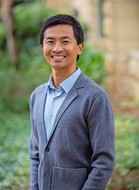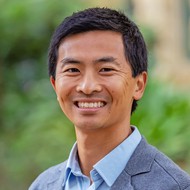About me
Benjamin “Benji” Xie (pronounced ‘she’ + ‘eh’) is an Assistant Professor of Computer Science at the University of Denver and Faculty Affiliate with the Scrivner Institute of Public Policy. He is a computing education researcher who uses human-computer interaction, psychometric, and social science methods to design critical and equitable interactions with data. His research has been published in premier venues in computing education research (ICER, TOCE, CSE, L@S, SIGCSE) and human-computer interaction (CSCW/PACMHCI, CHI), as well as ACM magazines (CACM, Inroads, IX, XRDS). He has received awards for his research in diversity, equity, and inclusion from the ACM Conference on Computer-Supported Cooperative Work And Social Computing (CSCW) and the University of Washington. His research has received funding from the National Science Foundation, Google Cloud, OpenAI, Woods Institute for the Environment, and the Stanford Accelerator for Learning.
Previously, Benji was an a Postdoctoral Fellow with Stanford University’s Graduate School of Education, Human-Centered AI Institute, and McCoy Family Center for Ethics in Society. He received his PhD in information science from the University of Washington Information School, where he was a National Science Foundation (NSF) Graduate Research Fellow and also a research intern with nonprofit Code.org. He received his Master’s and undergraduate degrees in computer science from MIT, where he was an MIT EECS-Google Research and Innovation Scholar researching with MIT App Inventor.
High-Resolution Headshots
Photos by Lotus Pod Designs, Oct 2022.Research Timeline
Updated Sep 2022. A few life events included to provide context.
2022: In September, I started as an Embedded Ethics Postdoctoral Fellow at Stanford University’s Institute for Human-Centered Artificial Intelligence (HAI) and Center for Ethics in Society. In August, I attended ICER 2022 to present my paper on A Decaded in Demographics. I took most of June-August off to spend time with my family. In June, I attended a Dagstuhl Seminar on Theories of Programming. I researched as postdoctoral scholar at the UW Information School through June, continuing work with my PhD advisor Amy Ko and collaborating with researchers in the UW College of Education and Educational Testing Service.
2021: I deployed and evaluated Student Amp, a tool collects contextualized student feedback so teaching teams can understand inequities in large remote computing courses. I was named a 2021 Husky 100 by UW. I presented a poster on my dissertation at the 2021 ICER conference. I also earned my PhD in information science, successfully defending my dissertation in the autumn.
2020: The dual pandemics of COVID-19 and reckoning with systemic racism began, requiring me to take more time away from research to adapt to the new situation. I wrote an article in California’s oldest newspaper to address COVID-19 misinformation in my rural hometown. I secured NSF INTERN funding to intern with non-profit Code.org to use statistical and human-centric techniques to identify and address bias in the most used middle school curriculum in the world. See paper. I also secured a Google Cloud Research Grant for the development of Student Amp.
2019: I completed work with collaborators from the UW College of Education, Information School, and School of Computer Science to begin work on Codeitz, an online learning experience that afforded computing students the agency to guide their own learning. I also led a workshop at CHI 2019 on Learning, Education, and HCI (see paper and follow-up report).
2018: I worked with Dr. Min Li (UW College of Education), my advisor, and other UW collaborators to develop and evaluate a theory of instruction for introductory programming skills. I also worked with an undergraduate researcher to understand experiences of CS transfer students.
2017: I worked with labmate Greg Nelson to evaluate a system he created that teaches code reading skills. I spent part of the summer at Carnegie Mellon University as part of their LearnLab Summer School. I also adopted a rescue dog!
2016: I completed by Master’s at MIT and had a fantastic summer of adventure. In the fall, I moved to Seattle and began my Ph.D. at the University of Washington Information School as a National Science Foundation (NSF) Graduate Research Fellow working with Amy J. Ko. I also served as head of the educational co-op for Seattle Data for Good, a nonprofit dedicated to supporting community organizations with their data and technology needs.
2015: After completing my bachelor’s, I spent the summer working as a software engineering and research intern at EdTech start-up NovoEd, working under the guidance of Farnaz Ronaghi. During that summer, I also partnered with three others to create the app “Dave Sent Me” for the Outside Lands music festival. In the fall, I started my Master’s (MEng) in compter science at MIT with Hal Abelson and MIT App Inventor. I used machine learning and statistical techniques to analyze apps people created to understand how they used App Inventor to learn computing concepts. See paper, thesis.
2011-15: As an undergraduate at MIT, I studied computer science with a humanities concentration in education. I researched with Hal Abelson and MIT App Inventor as an MIT EECS-Google Research and Innovation Scholar. I also conducted research with the MIT Scheller Teacher Education Program to help build TaleBlazer. I spent summers working as a software engineering intern at AppNexus in 2014 and eBay in 2013. I also volunteered with Boston-based non-profits as part of MIT Code for Good.
Running is my meditation
Besides being a student and researcher, I also ran competitively in college. Since the age of 10, running has been my way of keeping my body busy so my mind could focus.
In my PhD, I ran marathons as part of Club Northwest. I placed second at the 2020 Disney World Marathon and also completed two Boston Marathons (2018, 19). I was in Boston running for the MIT Track team when the 2013 Boston Marathon bombings and subsequent murder of MIT police office Sean Collier occurred, so completing the Boston Marathon was a momentous occassion for me.
In my Master’s, I was a volunteer assistant coach for MIT cross country in the fall. I competed as part of the MIT track team in the spring.
In my undergraduate years, I competed in NCAA Division III with the MIT Cross Country, Indoor & Outdoor Track Teams. I served as a cross country captain for the later two years, during which the MIT Cross Country team won conference, placed top 3 in regionals, and qualified for national championships both years. My individual accolades included breaking a school record and earning Academic All-Region, All-Region, Academic All-Conference, All-Conference, and Most Improved.

